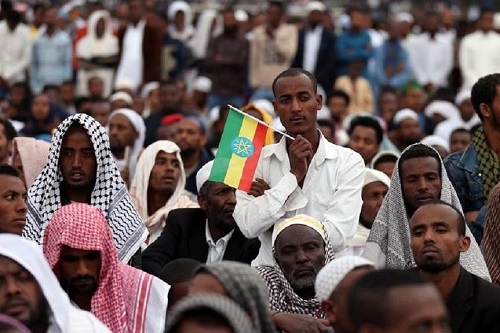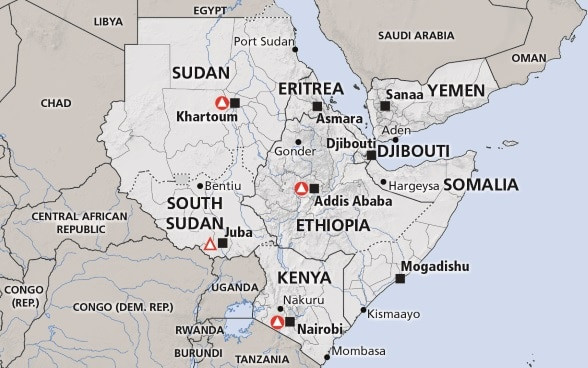Reuters photo
By
Fanuel Lakew
Ethiopia, the largest country in the region in terms of economy, military and population size, has been striving at its level best for the development of the region. For this matter, Ethiopia’s foreign policy in the Horn of Africa gives a priority to mutual benefit, cooperation, regional peace and integration.
Moreover, Ethiopia also keeps its role by being a pivotal player in the region under the new administration of Prime Minister Abiy Ahmed. Experts express views on the Ethiopian foreign policy in the Horn of Africa related to the political changes and reforms in the country.
The Horn of Africa, as most scholars describe it, has been a conflict-ridden area for a long period of time. Border conflicts, ethnic/clan clashes, proxy wars, and terrorism are among the challenges the region has been facing. In spite of this, its geographical position is strategically located as Bab-el-Mandeb and the Red Sea are the passages to connect Europe with Asia. Various actors have been aspiring to gain the upper hand in the region.
In his journal article entitled ‘Ethiopia’s Role and Foreign Policy in the Horn of Africa’, Berouk Mesfin states that: ‘Ethiopia is geographically located at the centre or, better, at the heart of the Horn of Africa. Despite it being land-locked since 1991 and from the standpoint of the elements of national power which scholars of international relations and strategy used to determine a state’s position in geopolitical struggles, Ethiopia stands out as a state that can play a critical role in the region. It has a large population which backs the government in time of crisis and represents nearly half of the Horn of Africa’s population with whom it retains historical and cultural ties.’
Prof Harry Verhoeven teaches at the School of Foreign Service in Qatar, Georgetown University and is the founder and co-convenor of the Oxford University China-Africa Network. In an exclusive interview, he notes that Ethiopia continues to emphasise the vision of regional integration envisioned by the late Premier Meles Zenawi in 2002. It continues to strive to have policy autonomy vis-a-vis with China, USA, EU, Gulf countries or any of its neighbours. In that sense, there is little fundamental change at least at the level of public discourse in the attempt to seemingly liberalize and increase greater engagement in human rights and political freedom.
Ghetnet Mitiku, a Senior Researcher at the Institute of Leadership and Good Governance of Ethiopian Civil Service University, on his part says that Ethiopia’s foreign policy approach to the regional neighbours has had an additional security dimension along with development and democratization.
Pertaining to the ongoing changes in the country after this April, the Professor emphasises that there is a greater openness to striking relations with Eritrea and others neighbours as well. “Now, I am a little bit cautious, maybe more than many people that actually mean on the ground. The single most important thing, especially on the issue of Ethiopia and Eritrea, is that the relations must be institutionalized. At the moment, progress on the relations made between the two leaders is important.”
The issue of currency, investment, the question of ports, security, education and others need to get due attention, he adds saying, at the moment; this doesn’t happen whatever the two leaders meeting. This is very important if these countries want to prevent a scenario that was happened in the mid-1990s. The importance of formal institution and arrangement is quite huge, he further notes.
Ghetnet argues that the positive developments in the relations between Ethiopia and Eritrea have already paid dividends in terms of peace and security in the Horn of Africa. He further notes that there are also ongoing efforts to develop Eritrea’s two major ports for utilization by Ethiopian merchant vessels. This comes on top of the country’s agreements to develop and utilize ports in Djibouti, Somalia and Kenya.
One should also note that the development of ports should be seen in the context of broader socio-economic integration, he also adds. However, Ghetnet seconds Harry’s idea saying there has to be a permissive institutional and legal atmosphere for such an approach in the form of a vision for a successful regional integration and a united Africa.
Trying to change the dynamics in the region from one which African countries fight over their scarce resources to cooperation is a good idea, Prof. Harry notes, adding the question as to how they implement to make it sustainable and work for everybody. In this regard, he says that Ethiopia’s foreign policy should focus very much on how to strengthen Intergovernmental Authority on Development (IGAD) and other regional fora as they are crucial to anchor any form of regional integration.
Furthermore, the professor gives emphasis that it’s very important for Ethiopia’s foreign policy to work carefully on how to institutionalise the growing role of gulf actors. “At the government, there is no so regional organization that the Gulf States and the Horn of Africa countries are part of.” It is because it will help Ethiopia as it is important for its national interest and long-term foreign policy objectives and regional integration.
With regard to Ethiopia’s performance in attaining its foreign policy and interests in the region, Prof. Harry points out that, so far, Ethiopia had made a promising start for the last two decades on some issues but for the next step of growth and contribution for regional peace, security and development, the institutional aspect is crucial.
Whereas, Ghetnet says that Ethiopia’s foreign policy performance has generally been positive in terms of its success in achieving its own goals as well as contributing to development, peace and security. “In relation to achieving its goals, the relationships with Kenya, Sudan, Djibouti and Somalia have had positive economic and political dividends for the country. The country has also contributed a lot to peace and security in Somalia and South Sudan as well as overall regional security through its role in IGAD and the AU,” he further pointed out.
All in all, Ethiopia’s effort to integrate the region through economic or political means is inevitable. The effort should be extended to the Gulf states because of their proximity and growing role in the region. In addition to this, such initiatives should not remain at the elite or leaders level. People-to-people relations ought to be strengthened as well. Most importantly, any kind of initiatives should be institutionalised to ensure their sustainability and applicability.
Fanuel Lakew
Fanuel Lakew is a reporter at the Ethiopian Herald Newspaper of the Ethiopian Press Agency. He did his B.A. degree in Political Science and International Relations from Addis Ababa University in 2012. He also served as the Secretary-General of the Ethiopian Political Science and International Relations. He as well studied M.A. in Politics and International Relations at the Central University of Gujarat, India. He can be reached at [email protected]



